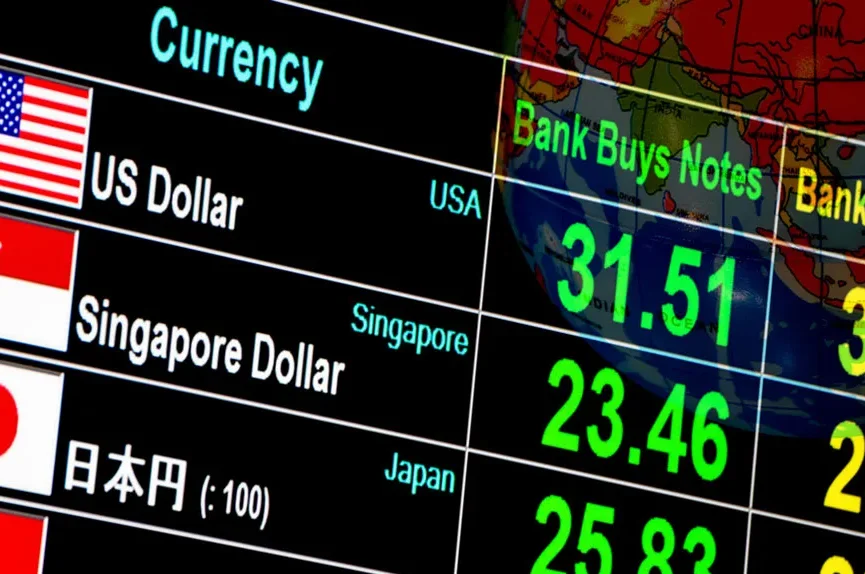Banks on Forex Rates – The foreign exchange (forex) market is influenced by numerous factors, and one of the most significant players is the banking sector. This article will explore how banks impact forex rates, the mechanisms involved, and the broader implications for traders and the global economy.
Table of Contents
ToggleBanks on Forex Rates:What Are Forex Rates?
Forex rates represent the value of one currency in relation to another. For example, if the EUR/USD rate is 1.10, it means 1 Euro can be exchanged for 1.10 U.S. Dollars. These rates fluctuate constantly due to various factors, including supply and demand dynamics, economic indicators, and geopolitical events.
Why Do Forex Rates Change?
Forex rates change primarily due to:
- Interest Rates: Central banks set interest rates that influence currency value. Higher interest rates typically attract foreign capital, leading to currency appreciation.
- Economic Data: Reports on GDP, employment, inflation, and trade balance can impact forex rates by affecting market perceptions of economic strength.
- Market Sentiment: Traders’ perceptions and reactions to news, events, or data releases can lead to rapid fluctuations in forex rates.
Role of Banks in the Forex Market
Central Banks
Central banks are the most influential entities in the forex market. They control monetary policy and can directly affect currency values through interest rate adjustments and interventions.
How Central Banks Impact Forex Rates:
- Interest Rate Decisions: When a central bank raises interest rates, it often leads to an appreciation of the national currency as higher rates offer better returns on investments.
- Quantitative Easing: Conversely, if a central bank lowers interest rates or engages in quantitative easing (buying government securities), it can lead to currency depreciation.
- Market Interventions: Central banks may intervene in the forex market by buying or selling their own currency to stabilize or influence its value.
Commercial Banks
Commercial banks also play a crucial role in the forex market, primarily as market makers and facilitators of currency transactions.
How Commercial Banks Influence Forex Rates:
- Liquidity Providers: They provide liquidity to the forex market by facilitating trades between buyers and sellers. This activity helps ensure that traders can execute their orders at desired prices.
- Speculative Trading: Many commercial banks engage in speculative trading, buying and selling currencies to profit from price fluctuations. Their trading activities can significantly impact forex rates.
- Customer Transactions: Banks execute currency transactions for individuals, businesses, and other entities. Large transactions can influence supply and demand, thereby affecting forex rates.
Interbank Market
The interbank market is where banks trade currencies with one another. This market sets the benchmark for forex rates and is characterized by high liquidity and low spreads.
Importance of the Interbank Market:
- Price Formation: The interbank market is crucial for price discovery. The rates determined here are often used by brokers and retail traders.
- Volume of Trades: With significant trading volumes, fluctuations in this market can quickly influence broader forex rates, impacting the retail forex market as well.
Factors Influencing the Impact of Banks on Forex Rates
Economic Conditions
The overall health of an economy significantly affects how banks operate and their influence on forex rates. Economic stability typically leads to stronger currencies, while economic turmoil can lead to depreciation.
Global Events
Political events, natural disasters, and global crises can lead to rapid changes in forex rates. Banks respond to these events by adjusting their trading strategies, which can further amplify market movements.
Speculation
Banks engage in speculative trading, betting on currency movements based on their analysis of economic data and market sentiment. Their positions can influence forex rates, especially during major news releases or economic data announcements.
Implications for Forex Traders
Traders should pay close attention to central bank policies and actions, as they can lead to significant market movements. Understanding how banks influence forex rates can help traders anticipate potential price changes.
Utilizing Economic Indicators
Monitoring economic indicators and central bank announcements is crucial for successful forex trading. Traders can use this information to make informed decisions and develop trading strategies.
Risk Management
Given the influence of banks on forex rates, implementing strong risk management practices is essential. Traders should set stop-loss orders and be prepared for volatility, especially around key economic events.
The impact of banks on forex rates is profound and multifaceted. Central banks and commercial banks play crucial roles in shaping currency values through their policies, trading activities, and market interventions. By understanding these dynamics, traders can better navigate the forex market and make more informed trading decisions.
As you engage in forex trading, stay informed about central bank announcements, economic data releases, and global events that can impact the market. Happy trading




